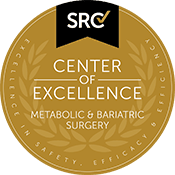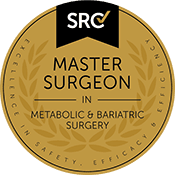
- Expertise
- Compassion
- Success
Lose the Weight and
Gain Back Your Life!
Sydney Weight Loss Surgery Preparation
Although it’s normal to be nervous, the day of your weight loss surgery is really an exciting day because it’s a major milestone on your road to a healthier, happier life. Here is a general overview of how to get ready for your Bariatric Surgery, and what to expect that day.
The Day Before Bariatric Surgery
On the day before your procedure, you will need to follow specific instructions to ensure all goes well the next day. Your team will provide you with a complete list of instructions on how to prepare for the surgery.
Here are two general guidelines
- Do not eat or drink anything after midnight. Your stomach must be empty for surgery to minimize risks during the operation
- Ask a friend or a family member to be at the hospital with you for comfort and support
The Day Of Bariatric Surgery
You will be admitted to the hospital on the morning of your surgery. You may be in the operating room for two or three hours, but the actual procedure typically takes about 1-2 hours depending on the type of your operation. Then you will spend a few hours in the recovery room.
Once the anesthesia has worn off, you may feel some pain or discomfort, which can usually be treated with ordinary pain relieve medication. The hospital staff will help you get out of bed and start moving as soon as possible to help prevent blood clots and respiratory problems.
Weight Loss Surgery Aftercare & Recovery
During the first few weeks after surgery, we do not think about weight loss as you need to take the time to recover from the operation and to start adjusting to your new life after your weight loss surgery. A big part of your long term weight loss success will be your motivation and commitment to a new lifestyle that includes a new diet and exercise plan, routine check ups with your surgeon, ongoing LAP-BAND® System adjustments (if you choose to have gastric banding procedure) and more. However, be patient with yourself in the first weeks after surgery. You have already taken the biggest step – the first one. Your new life and lifestyle you will have to create over time, not overnight. The first month after surgery entails:
- Recovery time from surgery
- Following strict dietary guidelines: liquid diet, pureed food soft foods
- Your first gastric band adjustment (only for gastric banding patients)
Bariatric Surgery Recovery
Here are some key points for your recovery in the first few days and weeks.
First Days After Weight Loss Surgery
- You can expect some soreness, especially after gastric banding procedure where the access port is, but it should subside (Please call your surgeon if the pain persists after a few days)
- To prevent infection, your surgeon may tell you not to shower for a day or so after surgery
- Try to walk as much as you can comfortably, so that you’ll regain strength and prevent blood clots, but take it slowly
First Week(s) After Weight Loss Surgery
- During the first week after surgery, allow yourself to recover and get plenty of rest
- In about a week, you should be able to return to work, provided it’s not physically demanding job
- For more physically active jobs, allow yourself two to three weeks to recover from surgery
- Within four to six weeks, you should be able to resume all normal activities and start a new exercise program Note: Before engaging in any physical activity or exercise program, first consult your Surgeon or your GP
- Dr Kuzinkovas will see you two weekly during the first month after surgery, so you will be sure your recovery is going well, and have any questions answered
Weight Loss Dietary Guidelines
- After surgery, you’ll need a new nutrition plan. You’ll learn about the positive changes you can and need to make in your diet and lifestyle from your surgeon and dietitian. It’s very important to follow your new eating and drinking instructions beginning immediately after the surgery
- In the first few days after your weight loss surgery, you will be on a liquid diet since only thin liquids will be tolerated by your stomach at that time. As you heal, you will gradually progress to pureed foods (one to four weeks post-op) and then soft foods (five weeks post-op). Finally, after about six weeks, you will be able to eat solid foods
The First Few Days Post-Surgery
It’s extremely important to follow the eating and drinking instructions immediately after the surgery. This allows your new stomach pouch to heal completely.
- In the early weeks, it’s crucial not to stretch the small stomach pouch above the LAP-BAND® System if you choose to have this type of procedure done. Vomiting will do this, while also increasing the chance of stomach tissue slipping up through the band
- Patients who underwent gastric sleeve procedure will follow dietitian advice. Vomiting with this procedure is extremely rare
- Right after the surgery, you can take an occasional sip of water or suck on an ice cube. Don’t take any more liquid than this, though
- The day after the operation, you can take a little more fluid but only a small amount at a time. Besides water, you should also choose clear liquids that have an adequate number of calories. To prevent nausea and vomiting, do not drink too much
Liquid Diet (1-2 days post-surgery)
Your goal during the first few days is to protect the small stomach pouch so that you can heal properly. It can only tolerate thin liquids at this time. It’s also important to stay hydrated by drinking lots of water (small amounts at a time). Other liquids recommended during this phase include:
- Clear broth or soup (with no vegetables or meat, and not creamy)
- Skim milk
- Fruit juice
- No-sugar-added popsicles
Pureed Foods (1-4 weeks post-surgery)
Now, you can start adding slightly textured foods. Think of the consistency of baby foods. This stage will help you transition to more solid foods later.
- Protein is very important for maintaining muscle while you lose weight. So, you should eat protein-rich foods first, and then move on to fruits and vegetables
- Foods in this stage may include
- Pureed skinless chicken or fish
- Mashed potatoes
- Peas
- Low-fat yogurt or pudding
Please note: In the first few weeks you may be able to eat foods that might not be allowed in your diet later, because they may contain too many calories. Remember, it’s more important in the first few weeks to let your stomach adjust to the LAP-BAND® System or gastric stapling than it is to lose weight. Also, your personal timing and progression into each dietary phase depends on your progress. In general, when it comes to your nutrition, you should follow the advice of your surgeon and/or dietitian.
Soft Foods (5 weeks post-surgery)
- Your meals can now include tender, cooked foods like fish and ground turkey
- Now that you can chew, make it a habit to chew foods well
- If you have dentures, be sure to cut your food into small pieces and chew your food thoroughly. By not chewing properly, you may experience vomiting, stomach irritation and swelling. You could also have stomach obstruction (obstruction of the stomach opening created by the LAP-BAND® System)
- Some products like bread, red meat, and rice may still cause you problems, so it is better to eat softer foods that are easier to digest. These might include foods such as moist white meat (chicken or pork) and fish
- If solid foods cause any nausea and vomiting, go back to the liquid diet you had earlier. Then you can slowly add soft foods and eventually transition to solid foods
- Always ask your doctor or dietitian for advice that is specific to you. Again, remember that vomiting may increase the incidence of band slippage, stomach slippage, or stretching of the small stomach pouch above the LAP-BAND®
Your First Lap Band Adjustment – For gastric banding patients
The first adjustment usually occurs four to six weeks after surgery, although the exact time varies from patient to patient. The LAP-BAND® System is designed to help you achieve steady and safe weight loss, so don’t be in a hurry. You and your surgeon will decide when the time is right for you to have your first adjustment.
At your first adjustment appointment, you should expect to discuss your eating habits, exercise, and rate of weight loss. This will help determine if it’s time for you to have a band adjustment. If it is, you can expect the following:
- An evaluation of your pouch size and stoma size before adjusting the band (this isn’t always done. Your surgeon may or may not evaluate your pouch size and stoma size before the adjustment.)
- Adjustment of your LAP-BAND® System
- Evaluation of your pouch size and stoma size after the procedure to confirm that the proper band adjustment has been made
Gastric Banding Patient Concerns
Wondering if bariatric surgery is right for you is a very common concern. As with any surgery, weight loss surgery may present risks. If traditional weight loss methods have not worked, bariatric surgery may be the right answer for you.
Coping With Fear And Physical Changes
Weight loss surgery changes the digestive process of your body for life. It is a major surgery, performed while the patients is under general anesthesia and for some people, the idea of surgery and anesthesia can provoke anxiety.
If the idea of surgery or anesthesia scares you, counter the fear by finding out more. Every surgery has risks, and you should discuss the benefits and risks of bariatric surgery with Dr. Kuzinkovas and anesthetist.
Finding Support
Many successful weight loss surgery patients say that their support network helped them immensely in maintaining their new healthy lifestyle changes. From family and friends to bariatric program support groups, there is a wealth of options available for people interested in gastric sleeve procedure, gastric banding and gastric bypass operations.
As an invaluable alternative you can Talk to Our Patients.
Request A Free Phone Consultation
Schedule a free phone consultation with Dr. Kuzinkovas
Click Here for Free Phone ConsultOur Locations
Our doctors are true professionals and very passionate about their job.
Our team is very caring, ethical, trustworthy, friendly and devoted.
South Eastern Sydney
(Main Office)
Advanced Surgicare
Suites 501/502, Level 5
St George Private Specialist Consulting Suites
131 Princes Highway
Kogarah NSW, 2217
(entrance via South St)
Fax: 02 9588 9471





